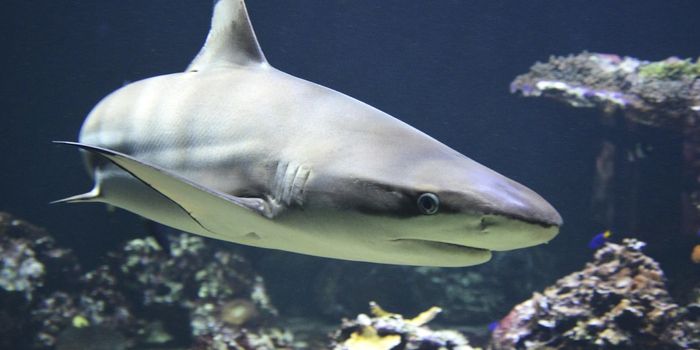These Sharks Stay Warm on Deep Dives, But How?
It’s no secret that ocean waters become substantially colder as you venture further beneath the surface; this is because the Sun’s rays can only stretch so far beneath the ocean’s surface before they become weak enough that heat and light emanating from them seem to disappear. Perhaps unsurprisingly, this impacts the behavior of some marine wildlife.
Image Credit: Barry Peters/Wikipedia
Scalloped hammerhead sharks, for example, are large tropical fish that favor warm temperatures over cold ones. These predators can often be found close to the ocean’s surface near the equator where temperatures sit around a comfortable 75º Fahrenheit. On occasion, however, they have been known to dive more than 2,600 feet below the ocean’s surface where temperatures drop off to a bone-chilling 40º Fahrenheit.
One issue, however, is that scalloped hammerhead sharks rely on body heat to function properly. If they become too cold, then their metabolism, muscles, and vision reach levels of impairment. This is bad because if the shark can’t keep moving, then it won’t absorb enough oxygen through its gills, and it will drown:
"Hammerheads are a tropical and warm temperate species. When their body temperature gets too low, they lose muscle function, visual acuity, and their metabolism slows down. If a shark gets too cold, it can't keep itself moving and breathe," explained Mark Royer, a marine biologist from the University of Hawaii Manoa.
Related: These daring fish swim inside of a shark's mouth to clean it
In what could only be described as a double-edged sword, scalloped hammerheads can’t use their gills too much on deep dives either, as the cold water rushing through their gills would quickly chill the animal’s blood to unsafe temperatures.
Given the apparent risks associated with becoming too cold on deep dives, it has long riddled marine biologists as to why scalloped hammerhead sharks even bother plunging to such depths. On the other hand, new observations indicate that the large fish manage to avert these dangers on deep dives; experts just aren’t entirely sure how the sharks are doing it.
"The laws of thermodynamics hold; we know the water is super cold and the sharks are staying warm. So, the sharks can't be dumping body heat out through their gills," Royer continued.
"We don't know what the mechanism is, whether it's simply closing their mouths and closing their gills, or if they're shunting the blood away from their gills. Either one of those mechanisms means there is no longer gas exchange at the gills, so the shark is basically holding its breath in a way that a shark can while it's conducting these deep dives."
Related: These seals hand together to scare away a predator shark
While studying the sharks, Royer ascertained that the scalloped hammerhead sharks would cruise slowly to around 330 feet and then adjust their pitch so that they could quickly rush into the danger zone. After a few minutes, the sharks would then rush back up to around 1,000 feet. The sharks’ body temperatures fell, but only after the sharks returned to the 1,000-foot depth.
Also worthy of note, the sharks returned to the surface for almost 45 minutes at a time to warm back up before repeating the deep-diving process again – rinse and repeat. It appears as thought the sharks are well aware of the dangers associated with deep dives and that they carefully pace themselves to manage their body temperature when they go for their deep dives.
While the research provided a glimpse into the shark’s fascinating world, it didn’t answer every question. Researchers still don’t know for sure why the sharks go on such deep dives, but stomach content analyses suggest that they could be hunting for squid. Future research could incorporate camera data that will provide more insight as to what the sharks are doing and how they do it.
Source: Phys.org









